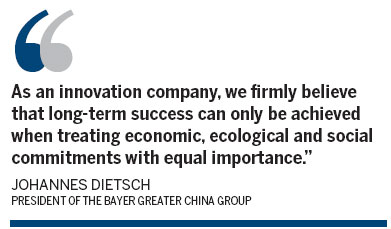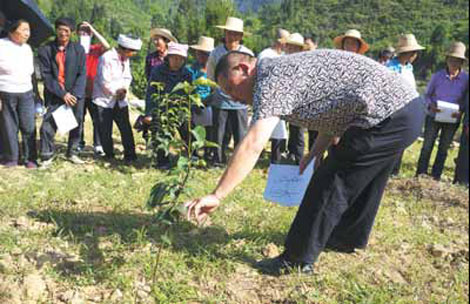Bayer's new methods bring farmers bumper crop
Updated: 2013-06-18 07:26
By Wang Jinhui and Shi Xiaofeng (China Daily)
|
||||||||
|
A farmer in southern China teaches farmers the company's new planting techniques. Provided to China Daily |
Chai Maoqing never thought that he would become one of the richest farmers in Longyou, a county in the western region of Zhejiang province that is renowned for its agriculture.
In 2008, he had just 600 square meters of land, but now he has more than 93 hectares, or 930,000 square meters of rice fields.
"For the past years, what I have learned is how vital the concept of sustainability is to us," said the 48-year-old farmer, adding that traditional pesticides and high labor costs are no longer the only ways to achieve high yields.
Last year, the yield of Chai's farmland reached about 14.23 metric tons per hectare, the highest in the whole region, and he earned an annual income of roughly 700,000 yuan ($107,692).
"The environmentally friendly and effective fertilizers played a key role in improving the production, through which I could largely reduce the frequency of pesticide use and save labor costs," Chai said.
Liao Hongliang, 39, another farmer in the county, said he has also benefited from sustainable farming.
"I received a training course in 2012, and this year I decided to use a new fertilizer," Liao said.
"Though the fertilizer costs more than traditional types, I am willing to pay for it after taking the productivity and high-quality rice into consideration."
Liao is expecting huge returns from a trial run of sustainable methods on 7 hectares of farmland.
"This summer, I will have a big harvest."
The stories of Chai and Liao are just two examples of German multinational Bayer Group's Much More Rice project in southern China.
As a global leader with core competitiveness in healthcare, crop science and high-tech materials, Bayer has always been committed to providing more innovative agricultural solutions to its Chinese customers, according to the company.
To date, Bayer has established around 300 experimental rice production bases in the country, covering regions in northeastern China, the Yangtze River Delta and southern China.
The company said the project aims to offer farmers systematic knowledge of advanced planting technologies that covers the entire process from sowing to harvest to achieve a better input-output ratio as well as ecological equilibrium.
The project marks the company's transformation from merely a product provider to a solution consultant that cares for the natural environment, plant health and high efficiency, according to the company.
To cater to different conditions in the country, Bayer has also maintained a cooperative approach to working with local governments, technological agencies and plant protection stations.
Through partnerships, Bayer is able to help farmers find the most ideal ways to increase production throughout different regions, said Jiang Xuehui, regional manager of technology at Bayer CropScience Co Ltd.
He said that localization is the key for Bayer's success.
"When it is necessary, we will modify the formula of every fertilizer according to farmers' demands as well as the local environment," Jiang said.
"Moreover, our goal is to improve both the production and quality by advocating the scientific way of planting, which is not relying on chemicals and pesticides but rather on rich soil and the natural cycle."
Zhang Chenguang, head of the plant protection station in Longyou, said Bayer has not only brought about high-end products and technologies but more importantly an ecological concept that is crucial for the region's long-term development.
In 2009, Bayer's innovative products, including Gaoqiao, Antaisheng and Naguwen, entered the local market in Longyou, and a large number of Bayer's experimental fields sprung up between 2009 and 2012.
In addition to promoting advanced technologies in the nation's developed regions, Bayer also contributes to poverty alleviation in remote areas, such as Wanzhou in Chongqing, through its flagship multi-million-yuan Bayer China Rural Development Project, according to the company.
Johannes Dietsch, president of the Bayer Greater China Group, said that corporate social responsibility is a vital part of the company's overall strategy in the country.
"This year, Bayer celebrates its 150th anniversary. As an innovation company, we firmly believe that long-term success can only be achieved when treating economic, ecological and social commitments with equal importance," he said.
"Meanwhile, the company is committed to being a thought leader in social corporate citizenship, globally and in China."
Since 1882, when it first entered the Chinese market, Bayer has taken an active role in boosting the country's economic growth through technological innovation, corporate responsibility and high-end services. Today, Bayer has more than 12,000 employees in China.
In 2012, its sales revenue in China totaled $4.2 billion.
In addition to its surging business, Bayer has also made great contributions to the country's charity work.
For example, Bayer has launched the 150 Role Models Project on its 150 anniversary this year, which sponsors and encourages more employees to participate in volunteer activities.
A total of nine charitable projects from Bayer China have been selected during the process, including environmental protection, community education and services.
According to the company, it will continue the efforts to boost the country's sustainable development in the future.
Contact the writers at wangjinhui@chinadaily.com.cn and shixiaofeng@chinadaily.com.cn

(China Daily 06/18/2013 page24)

 Michelle lays roses at site along Berlin Wall
Michelle lays roses at site along Berlin Wall
 Historic space lecture in Tiangong-1 commences
Historic space lecture in Tiangong-1 commences
 'Sopranos' Star James Gandolfini dead at 51
'Sopranos' Star James Gandolfini dead at 51
 UN: Number of refugees hits 18-year high
UN: Number of refugees hits 18-year high
 Slide: Jet exercises from aircraft carrier
Slide: Jet exercises from aircraft carrier
 Talks establish fishery hotline
Talks establish fishery hotline
 Foreign buyers eye Chinese drones
Foreign buyers eye Chinese drones
 UN chief hails China's peacekeepers
UN chief hails China's peacekeepers
Most Viewed
Editor's Picks

|

|

|

|

|

|
Today's Top News
Shenzhou X astronaut gives lecture today
US told to reassess duties on Chinese paper
Chinese seek greater share of satellite market
Russia rejects Obama's nuke cut proposal
US immigration bill sees Senate breakthrough
Brazilian cities revoke fare hikes
Moody's warns on China's local govt debt
Air quality in major cities drops in May
US Weekly

|

|








